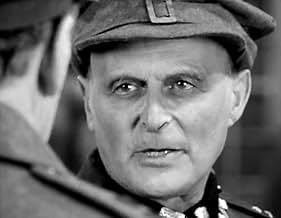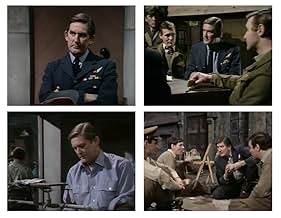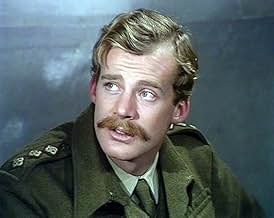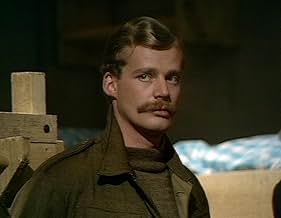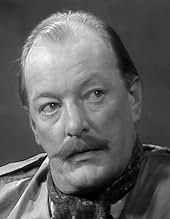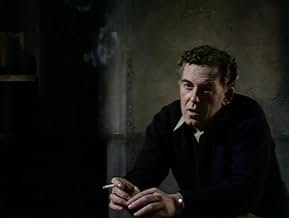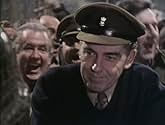Colditz
- TV Series
- 1972–1974
- 50m
IMDb RATING
8.3/10
1.1K
YOUR RATING
The series deals with Allied prisoners of war imprisoned at Colditz Castle and their many attempts to escape captivity, as well as the relationships formed between the various nationalities ... Read allThe series deals with Allied prisoners of war imprisoned at Colditz Castle and their many attempts to escape captivity, as well as the relationships formed between the various nationalities and their German captors.The series deals with Allied prisoners of war imprisoned at Colditz Castle and their many attempts to escape captivity, as well as the relationships formed between the various nationalities and their German captors.
- Nominated for 3 BAFTA Awards
- 1 win & 3 nominations total
Browse episodes
Featured reviews
Some strange and uniformed comments/criticisms about this excellent series.
One says that was a 'goof' to show prisoners in 'dress uniforms'. A brief search for photos of Colditz prisoners online will show that all POW officers possessed proper uniforms, as under the Geneva Convention these could be requested via the Red Cross. It would have been an unlikely mistake, as Pat Reid was an adviser on the series.
Another says that there were no Americans in Colditz. There were in fact three Americans: Colonel Florimond Duke, Captain Guy Nunn, and Alfred Suarez.
Some liberties were clearly taken for dramatic effect. For example, the famous 'Tea Chest' escape is featured. David McCallum's character, Simon Carter was based on the real Tea Chest escaper, 'The Medium Sized Man' aka Fl Lt Dominic Bruce OBE MC AFM KSG (Wikipedia has a very comprehensive biography, well worth a read) who did not deliberately give himself up as Carter does, but was only caught weeks later in Danzig.
For the most part, this series gives a fairly accurate portrayal of the struggle between the inveterate escapers (you were only put in Colditz if you had escaped from somewhere else, and got caught) and the well trained German security officers.
One says that was a 'goof' to show prisoners in 'dress uniforms'. A brief search for photos of Colditz prisoners online will show that all POW officers possessed proper uniforms, as under the Geneva Convention these could be requested via the Red Cross. It would have been an unlikely mistake, as Pat Reid was an adviser on the series.
Another says that there were no Americans in Colditz. There were in fact three Americans: Colonel Florimond Duke, Captain Guy Nunn, and Alfred Suarez.
Some liberties were clearly taken for dramatic effect. For example, the famous 'Tea Chest' escape is featured. David McCallum's character, Simon Carter was based on the real Tea Chest escaper, 'The Medium Sized Man' aka Fl Lt Dominic Bruce OBE MC AFM KSG (Wikipedia has a very comprehensive biography, well worth a read) who did not deliberately give himself up as Carter does, but was only caught weeks later in Danzig.
For the most part, this series gives a fairly accurate portrayal of the struggle between the inveterate escapers (you were only put in Colditz if you had escaped from somewhere else, and got caught) and the well trained German security officers.
Watched this as a kid and then a few years ago, and am now binge watching again. After the first 3 parts that get the men to Colditz, this is one of the finest things the BBC ever did. The acting throughout is quite brilliant, with the passing of time - so hard to capture - superbly done. The exchanges between Jack Hedley and Bernard Hepton are some of the finest in the history of British TV.
I watched this on T.V. as a Kid, IN PARTICULAR i liked the character played by Bernard Hepton as the commandant and can remember as if it was yesterday this unique part, right down to the frequent clearing of the throat and his general manner, i can never recall missing an episode and used to look forward to it being screened every week, needless to say i was very disappointed when the Series came to an end and would love to own the whole series, Anyone out there know if this was ever released on Video or D.V.D. and if so where it can be obtained OR WHEN IT MAY BE RE-SCREENED IN THE FUTURE ?
Please let me know if any one notices it popping up on the History Channel again in the future, Gary@ichthus88.force9.co.uk, Thanks in advance Cheers - Gary
Please let me know if any one notices it popping up on the History Channel again in the future, Gary@ichthus88.force9.co.uk, Thanks in advance Cheers - Gary
I saw Colditz when it first came out and much enjoyed seeing it again nearly fifty years later. There are no bad episodes, at the time of writing none are rated lower than 7.8. But there are very few reviews and I'm surprised more people don't seek out quality classic stuff rather than settle for the dreary rubbish now served up on tv.
Of the episodes I'd rate 10, Tweedledum is best loved, three reviews of it have said all that can usefully be said. In Ace in The Hole a new inmate, highly decorated RAF officer Tony Shaw (Jeremy Kemp) is polite but somewhat aloof, showing little interest in escaping. This is the most thoughtful episode, Shaw's riveting verbal dual with Major Mohn about the nature of military accomplishment is the best five minutes dialogue in the series. Among strong competition my favourite is The Gambler, in which Ray Barrett plays a ruthlessly amoral card sharp, by a country mile the most dislikeable prisoner.
I would have liked to have seen more of one or two interesting characters who appeared just once. Such as Major Schaeffer (Michael Gough) in Maximum Security, whose alcohol fuelled distain for the Third Reich would have made the perfect foil for Mohn. A couple of the regulars I suspect were there primarily for their looks, no names no pack drill as they say in the army.
Of the episodes I'd rate 10, Tweedledum is best loved, three reviews of it have said all that can usefully be said. In Ace in The Hole a new inmate, highly decorated RAF officer Tony Shaw (Jeremy Kemp) is polite but somewhat aloof, showing little interest in escaping. This is the most thoughtful episode, Shaw's riveting verbal dual with Major Mohn about the nature of military accomplishment is the best five minutes dialogue in the series. Among strong competition my favourite is The Gambler, in which Ray Barrett plays a ruthlessly amoral card sharp, by a country mile the most dislikeable prisoner.
I would have liked to have seen more of one or two interesting characters who appeared just once. Such as Major Schaeffer (Michael Gough) in Maximum Security, whose alcohol fuelled distain for the Third Reich would have made the perfect foil for Mohn. A couple of the regulars I suspect were there primarily for their looks, no names no pack drill as they say in the army.
When the very popular and succesful "Family at War" series finished a new wartime drama was made about the stories and exploits of British prisoners of war being held at Oflag 4c known as Colditz. This BBC production ran two seasons from 1972 to 1974 and although repeated, perhaps twice, it wasn't shown again after it's final airing in 1975 until it was broadcast on UK Gold many years later. The series mostly centered around the British contingent and was filmed mostly on video which only added to the claustrophobic feel of being incarcerated. This castle deep inside Germany was used as a POW camp to house highly decorated or prominent captured service men as well as troublesome officers who were well known escapers. Other nationalities included French, Dutch, Polish as well as Americans.
The German captures were headed by the Kommandant a veteran of WW1 and strictly by the book man. Straight backed a committed patriot but dignified, took his responsibilities very seriously and felt that observing the Geneva convention was vital in helping German POW's deal with their captivity in allied POW camps, therefore, he was tough but fair. This was clearly on display when he finally understood Colonel Preston's predicament after the death of his wife in England and the compassionate act of not returning a letter with other personal effects to a dead serviceman's wife, giving the impression he'd never received the last letter.
He was supported by the very imposing Hauptmann Ulmann his security chief who was also committed to his duties but nevertheless earned the respect of the POW's as he too observed the Geneva convention. This was in sharp contrast to the Second in command Major Mohn who came in the second season. He was committed to the cause but arrogant as well as being a strong party member who had connections with the hierarchy in the Nazi movement. Although decorated and wounded in combat because of his underhanded methods towards his duties and his constant provocation towards the prisoners he eventually became despised.
The series found its feet in the 4th episode of the first season which centered on the arrival of Colonel Preston who became the senior British officer. After some initial resistance from the British prisoners, he soon gained the respect of them. Through his ability to command he brought a sense of purpose and discipline to the officers by initiating a rotation of officer of the day, daily orders being posted and the forming of an escape committee. The other main senior British officers were Captain Pat Grant the head of the escape committee, Flight Lieutenant Carrington, submariner Lieutenant Dick Player and the short tempered and moody flight Lieutenant Carter.
Despite the first series climaxing on a two-part episode with an attempted break out of four British officers, I think that season two was just slightly better, probably benefiting from the presence of the nasty Major Mohn. Two seasons were probably enough for the series and ended with the war coming to an end with the United States and Russian forces closing in on the castle. I think that a short 2-3-part miniseries a few years later centering around a reunion of some of the officers with the intention of tracking down Horst Mohn and trying to bring him to justice would have been satisfying. It didn't happen, nevertheless a great series to watch, I'd highly recommend Colditz.
The German captures were headed by the Kommandant a veteran of WW1 and strictly by the book man. Straight backed a committed patriot but dignified, took his responsibilities very seriously and felt that observing the Geneva convention was vital in helping German POW's deal with their captivity in allied POW camps, therefore, he was tough but fair. This was clearly on display when he finally understood Colonel Preston's predicament after the death of his wife in England and the compassionate act of not returning a letter with other personal effects to a dead serviceman's wife, giving the impression he'd never received the last letter.
He was supported by the very imposing Hauptmann Ulmann his security chief who was also committed to his duties but nevertheless earned the respect of the POW's as he too observed the Geneva convention. This was in sharp contrast to the Second in command Major Mohn who came in the second season. He was committed to the cause but arrogant as well as being a strong party member who had connections with the hierarchy in the Nazi movement. Although decorated and wounded in combat because of his underhanded methods towards his duties and his constant provocation towards the prisoners he eventually became despised.
The series found its feet in the 4th episode of the first season which centered on the arrival of Colonel Preston who became the senior British officer. After some initial resistance from the British prisoners, he soon gained the respect of them. Through his ability to command he brought a sense of purpose and discipline to the officers by initiating a rotation of officer of the day, daily orders being posted and the forming of an escape committee. The other main senior British officers were Captain Pat Grant the head of the escape committee, Flight Lieutenant Carrington, submariner Lieutenant Dick Player and the short tempered and moody flight Lieutenant Carter.
Despite the first series climaxing on a two-part episode with an attempted break out of four British officers, I think that season two was just slightly better, probably benefiting from the presence of the nasty Major Mohn. Two seasons were probably enough for the series and ended with the war coming to an end with the United States and Russian forces closing in on the castle. I think that a short 2-3-part miniseries a few years later centering around a reunion of some of the officers with the intention of tracking down Horst Mohn and trying to bring him to justice would have been satisfying. It didn't happen, nevertheless a great series to watch, I'd highly recommend Colditz.
Did you know
- TriviaThe series takes place from May 1940 to April 1945.
- GoofsAll of the prisoners are seen dressed in impeccable uniforms, from uniform caps with insignia down to highly polished boots. The shirts and pants are clean and pressed, and the senior officers even have ties. None of these would have been carried into battle, and even if they had been, would surely have shown signs of wear after years in prison camps. In reality the prisoners had to make due with whatever they could gather together, certainly not the high quality uniforms featured in the series.
- ConnectionsFeatured in Night of a Thousand Shows (2000)
- How many seasons does Colditz have?Powered by Alexa
Details
- Release date
- Country of origin
- Languages
- Also known as
- La fuga de Colditz
- Filming locations
- Stirling Castle, Stirling, Scotland, UK(Title sequence and exteriors)
- Production companies
- See more company credits at IMDbPro
Contribute to this page
Suggest an edit or add missing content

